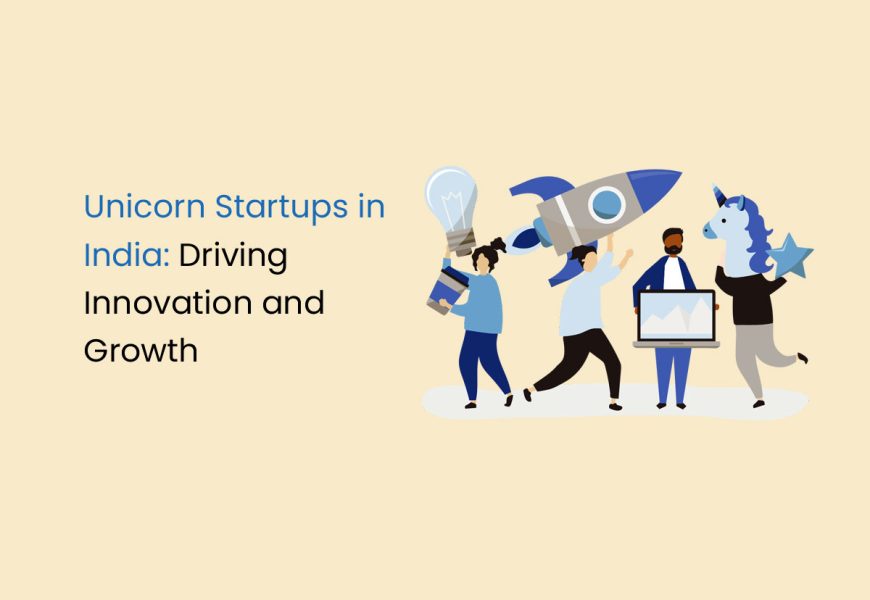The business world is dynamic, and startups that make it big are a rare breed. Unicorn startups are in one such elite category. These exceptional ventures have not only captivated the business world but also redefined our understanding of innovation and success. India, known for its vibrant entrepreneurial spirit and growing startup ecosystem, has been a fertile ground for these extraordinary enterprises. These unicorns are not just reshaping industries; they are leaving an indelible mark on the global stage. But before we delve deeper, let’s start with the basics.
What is a Unicorn Startup?
The term “unicorn startup” refers to a privately held startup company valued at over $1 billion, a concept coined by venture capitalist Aileen Lee. This phrase uses the mythical unicorn to emphasise the statistical rarity of such highly successful ventures.
These unicorns are renowned for their innovative and disruptive approaches, operating across diverse sectors like technology, e-commerce, finance, healthcare, and more. They exhibit swift growth and garner substantial investments from venture capitalists and other investors. Leveraging advanced technologies, unique business models, or strategic market approaches, these companies gain a competitive edge, allowing them to capture significant market share.
Unicorn Startups in India
As of May 2022, India’s Startup Ecosystem stands tall as the third-largest globally in terms of unicorn count, boasting an impressive milestone of 100 unicorns. Collectively valued at $332.7 billion, these startups signify not just financial prowess but also a testament to India’s prowess in entrepreneurship. Amidst the fast-paced rhythm of the economy, these Indian unicorns are not just thriving – they are thriving remarkably.
However, the first quarter of 2023 brought a pause in this unicorn march. According to a report by Tracxn, a renowned market intelligence platform, no new unicorns graced India’s startup landscape from January to March 2023. This marked a significant contrast to the preceding year, which witnessed the birth of 14 unicorns during the same period. The report attributes this decline to a reduction in late-stage funding, which plummeted by 79 per cent in Q1 2023, amounting to $1.8 billion, compared to the same period in 2022.
This article invites you on an exploratory journey into the realm of Indian unicorns – an intriguing domain where innovation meets investment. We delve into the sectors they dominate, the revolutionary solutions they bring forth, and the profound impact they impart on the Indian economy and society at large. Join us as we uncover the narratives of these remarkable entities, illuminating the path for the future of entrepreneurship in India.
Notable Indian Unicorn Startup Success Stories
1: 1mg
Established in 2015 by Prashant Tandon, Gaurav Agarwal, and Vikas Chauhan, the healthtech startup 1mg is a comprehensive platform offering medicine delivery, B2B distribution of pharmaceuticals, healthcare products, diagnostics, and telemedicine services. Achieving the status of India’s fifth healthtech unicorn, 1mg secured this distinction after a significant funding round led by Tata Digital, amounting to $40 million.
As stated on the healthtech unicorn’s official website, 1mg operates across more than 1,800 cities and towns in India, successfully dispatching over 31 million orders since its inception in 2015. Notably, 1mg entered a new phase after its acquisition by Tata Digital in 2021, leading to its rebranding as Tata 1mg. Currently, Tata 1mg is an integral component of Tata Digital’s super app, Tata Neu.
Despite its remarkable growth, Tata 1mg faced challenges in the financial domain. The company reported widened losses, totalling INR 526 crores in FY22, reflecting a 67% increase from the INR 314 crores recorded in FY21. In contrast, its consolidated revenue experienced a substantial surge, reaching INR 644.8 crores, marking a remarkable 104% growth from the INR 316 crores reported in FY21. This growth, however, was accompanied by an 85% increase in total expenses, which rose to INR 1,171 crores from INR 630 crores in FY21.
2: Shiprocket
Founded in 2017 by Saahil Goel, Vishesh Khurana, Gautam Kapoor, and Akshay Gulati, Shiprocket stands as a prominent Gurugram-based third-party logistics service provider. Backed by major investors like Zomato, Temasek, and Bertelsmann, Shiprocket achieved unicorn status in August 2022, becoming India’s 106th unicorn after securing a significant funding round of $33.5 million led by Lightrock India.
With a strong presence, Shiprocket caters to the logistics requirements of over 2.5 lakh sellers throughout India, facilitating shipments to an impressive count of more than 70 million consumers annually. The company specialises in offering comprehensive logistics services to both e-commerce sellers and direct-to-customer (D2C) brands, incorporating cutting-edge technology to enhance their logistics solutions.
Shiprocket executed five acquisitions in 2022, including a significant milestone – the acquisition of rival third-party logistics player, Pickkr, for a substantial $200 million in June. This move marked one of the most substantial acquisitions in the Indian startup ecosystem, further solidifying Shiprocket’s position in the industry.
3: 5ire
In 2021, entrepreneurs Pratik Gauri, Prateek Dwivedi, and Vilma Mattila co-founded 5ire, a cutting-edge 5th-generation Layer-1 (L1) blockchain network. This deep-tech startup achieved a significant milestone in July 2022 when it joined India’s unicorn league. This achievement followed a funding round that saw 5ire securing an impressive $100 million investment. The funding was led by the UK-based conglomerate SRAM & MRAM, valuing 5ire at $1.5 billion.
Central to 5ire’s innovation is its proprietary blockchain, known as 5irechain. This blockchain is uniquely rooted in sustainability principles and operates on a Proof-of-Benefit methodology for consensus. 5ire’s blockchain stands out by quantifying and rewarding sustainability efforts through a distinctive mathematical model. Pratik Gauri explained that the Proof-of-Benefit system assigns scores based on the United Nations’ 17 sustainable development goals (SDGs) and assesses 650 environmental, social, and governance (ESG) parameters.
As a newly minted unicorn, 5ire remains steadfast in its commitment to India. The company maintains a core focus on the Indian market while actively collaborating with diverse global entities, including corporations and government agencies. Their shared goal is to leverage blockchain technology to address a wide array of challenges across various sectors, emphasising a sector-agnostic approach to problem-solving.
4: OneCard
Established in 2018 by Anurag Sinha, Rupesh Kumar, and Vaibhav Hathi, OneCard, a Pune-based fintech startup, has emerged as a prominent player in the credit card industry. In July 2022, OneCard achieved unicorn status, securing $100 million in funding led by Temasek, propelling its valuation to $1.25 billion. Besides issuing Visa credit cards, OneCard offers a user-friendly credit score platform, OneScore, enabling users to access their credit scores at no cost. With over 2.5 lakh cards disbursed to date, OneCard has positioned itself as India’s 22nd fintech unicorn.
5: LeadSquared
Founded in 2011 by Nilesh Patel, Sudhakar Gorti, and Prashant Singh, LeadSquared is a distinguished provider of CRM, marketing, and sales software solutions. The India and US-based startup earned its unicorn status in June after securing $153 million in funding from WestBridge Capital. Boasting a clientele that includes industry giants like BYJU’S, Dunzo, Zoomcar, and Cars24, LeadSquared caters to diverse sectors such as edtech, healthcare, BFSI, real estate, automotive, and hospitality. The company plans to utilise its recent funding for strategic acquisitions and international expansion, demonstrating a commitment to rapid market growth.
6: Purplle
Established in 2012 by Manish Taneja and Rahul Dash, Purplle stands out as a Mumbai-based e-commerce startup focusing on beauty-related products and appliances. In a recent Series E funding round, Purplle raised $33 million, elevating its valuation to $1.1 billion and securing its position as India’s 102nd unicorn. With a vast array of products from over 1,000 brands, Purplle boasts a customer base of 7 million users. The company’s strategic approach includes creating a diverse portfolio of brands, including FACES CANADA, Good Vibes, Carmesi, Purplle, and NY Bae, contributing to its success in the e-commerce landscape.
7: PhysicsWallah (PW)
Originating as a physics-focused competition preparation YouTube channel in 2016, PhysicsWallah, founded by Alakh Pandey and Prateek Maheshwari, has evolved into a comprehensive ed-tech platform dedicated to NEET and IIT/JEE exam preparation. This Noida-based startup achieved unicorn status by securing $100 million in a Series A funding round led by Westbridge and GSV Ventures. Notably, PhysicsWallah has facilitated the success of over 10,000 students in NEET and JEE exams, solidifying its reputation in the competitive exam preparation arena. With expansion plans underway, PhysicsWallah aims to establish 20 additional centres across the country, leveraging its recent funding to enhance educational outreach.
8: Open
Founded in 2017 by Anish Achuthan, Ajeesh Achuthan, Mabel Chacko, and Deena Jacob, Open has emerged as a leading neobanking fintech startup, providing comprehensive business banking, payments, and expense management services to small and midsize businesses (SMBs) globally. With a customer base of 2.3 million, Open has processed over $24 billion annually and continues to grow, adding 100,000 SMEs to its network monthly. Backed by key investors, including Temasek, BEENEXT, 3one4 Capital, and Trifecta Capital Advisors, Open remains committed to revolutionising financial services for businesses, positioning itself as a significant player in the fintech landscape.
Investment and Funding Landscape in India for Startups
India’s startup funding scene has experienced a substantial upswing, reaching unprecedented levels. Industry reports reveal that Indian startups amassed a staggering $21.9 billion through 1,168 deals in 2021, showcasing a notable 53% year-on-year growth.
Diverse Sources of Startup Funding
- Venture Capital (VC) Funding: Venture capital firms occupy a central role in nurturing early-stage startups with high potential. Esteemed VC entities like Sequoia Capital, Accel Partners, and Kalaari Capital have played pivotal roles in bolstering India’s startup ecosystem.
- Angel Investors: Angel investors, often seasoned entrepreneurs themselves, contribute seed-stage funding crucial for startups’ initial growth. Platforms such as Indian Angel Network and LetsVenture facilitate connections between startups and these influential angel investors.
- Corporate Investments: Corporations are increasingly recognising the promise within startups, leading to strategic investments. Major Indian conglomerates like Reliance Industries and Tata Group have established corporate venture capital arms, channelling funds into promising startups.
- Government Initiatives: The Indian government has launched impactful initiatives to boost startup funding, such as the Startup India program and the Fund of Funds for Startups (FFS). FFS, backed by a substantial corpus of INR 10,000 crore, is dedicated to providing crucial funding support to startups through selected venture capital funds.
Critical Sectors Garnering Funding Focus
- E-commerce and Consumer Internet: Startups operating in these sectors have garnered substantial funding, propelled by the rise of digital platforms and evolving consumer preferences. The digital landscape has ushered in transformative changes, necessitating significant investment in these ventures.
- Fintech: India’s fintech sector has experienced exponential growth, attracting significant investments owing to the country’s vast unbanked population and the surge in digital transactions. The sector’s potential has drawn substantial funding, fostering innovation and financial inclusivity.
- Healthtech: The COVID-19 pandemic has catalysed the healthtech sector. Increased funding has been directed towards startups focusing on telemedicine, health analytics, and online pharmacy services, addressing crucial healthcare needs in the country.
Government Aids for Startups
The Indian government has undertaken several notable initiatives to provide crucial financial support to entrepreneurs, addressing the challenges faced by startups in their early stages. Here is an overview of key government schemes designed to facilitate funding and investment for startups, tailored to the specific needs of the burgeoning entrepreneurial landscape in India:
Startup India Seed Fund Scheme (SISFS)
In the nascent stages of business, startups often grapple with fiscal constraints, particularly in areas like prototype development and product trials. To alleviate these challenges, the government introduced the SISF scheme, enabling startups to access funding of up to ₹20 lakh for research and development endeavors. This initiative aims to bolster innovation from the inception of a startup’s market entry.
Startup India Initiative
This comprehensive initiative benefits private limited enterprises, LLPs, and registered partnership firms, providing relief from taxation burdens. With approximately 50,000 businesses already benefiting from this program, startups can avail significant tax exemptions. Moreover, the initiative offers access to courses and mentorship programs, fostering sustainable development for startups. Neo-banking facilities like RazorpayX Tax Payments simplify tax compliance, offering startups an efficient platform for seamless financial management.
ASPIRE (A Scheme for Promotion of Innovation, Rural Industries, and Entrepreneurship)
ASPIRE focuses on transforming entrepreneurs into large-scale employers, particularly in rural areas. By establishing technological and incubation centres across rural India, this initiative empowers Micro, Small, and Medium Enterprises (MSMEs). ASPIRE encourages innovation in AgriTech, providing substantial grants to cover expenses related to plant and machinery. Recognising the vital role of agriculture in India’s economy, this initiative supports advancements in the agricultural sector.
Venture Capital Assistance Scheme (VCA)
To prevent startups, especially those in the agri-business industry, from falling into debt traps, the VCA offers working capital assistance with a maximum loan limit of ₹50 lakh. This interest-free line of credit ensures entrepreneurs in the farming sector have access to necessary funds, facilitating longer repayment periods.
Additionally, the Indian government oversees several other invaluable projects catering to fundraising endeavours for emerging corporations:
- Credit Guarantee Fund Trust for Micro and Small Enterprises (CGTMSE)
- Zero Defect Zero Effect (ZED) Certification Scheme
- Pradhan Mantri Mudra Yojana (PMMY)
- Dairy Entrepreneurship Development Scheme
- Single Point Registration Scheme
- ATAL Innovation Mission
- Modified Special Incentive Package Scheme (M-SIPS)
- Credit Linked Capital Subsidy for Technology Upgradation (CLCSS)
- Design Clinic Scheme for Design Expertise
- Qualcomm Semiconductor Mentorship Program (QSMP)
Challenges and Roadblocks
India’s startup surge isn’t a fleeting trend; it’s here to stay. The recent Prime Ministerial endorsement has further bolstered the entrepreneurial spirit in the nation. Drawing inspiration from Silicon Valley, Indian startups face a unique set of challenges, from hiring the right talent to securing crucial capital.
- Hiring the Right Talent: The quest for the right talent is akin to searching for a needle in a haystack. With modest budgets compared to corporate giants, startups often struggle to attract skilled professionals. Passion becomes the currency; entrepreneurs must infuse their teams with their fervour, building a foundation strong enough to weather any storm.
- Capital Conundrum: There exists a symbiotic relationship between investors and startups. Securing funds is vital. However, capital isn’t just about the initial seed; it’s the lifeblood for scaling and sustaining a venture. Planning finances meticulously, encompassing marketing, PR, and expansion, is crucial. While external investment provides a push, the startup’s intrinsic value is the bedrock of success.
- Cultural Mindset and Infrastructure Hurdles: India’s societal ethos often prioritises secure jobs over entrepreneurial endeavours. Coupled with infrastructural challenges like erratic power supply and inadequate connectivity, startups face an uphill battle. A corruption-free environment, friendly regulations, and robust infrastructure are essential for attracting investors.
The Future of Unicorn Startups in India
In the next three years, a cohort of 51 high-growth startups, valued between $500 million to $1 billion, are poised to join the coveted unicorn club, as per the ASK Private Wealth Hurun India Future Unicorn Index 2023. These startups have cumulatively secured a remarkable funding of $9.6 billion to date. The term ‘unicorn’ is reserved for companies that achieve a market valuation of $1 billion.
These promising startups are categorised as ‘Gazelles,’ defined by the Hurun report as startups founded after 2000 with the potential to become unicorns within three years. Anas Rahman Junaid, founder of Hurun India and Chief Researcher, emphasises the significance of Gazelles and Cheetahs in providing insights into the future economy. These startups indicate which sectors are attracting top talent and smart capital globally, shedding light on the most thriving startup ecosystems across countries and cities.
The index talks about a diverse array of Gazelle companies spanning various sectors. The FinTech sector leads the pack with 11 Gazelles, followed closely by six Gazelles from the SaaS sector. Additionally, E-commerce and AgriTech sectors each contribute four Gazelles, showcasing the breadth of innovation in these industries.
Some notable Gazelles in the index include:
- Ather Energy: Founded in 2013 and based in Karnataka, Ather Energy specialises in manufacturing electric scooters. Their product lineup includes models like the Ather 450X and the Ather 450X Pro, contributing to the growth of the electric vehicle sector.
- Leap Scholar: Leap Scholar supports Indian students aspiring to study at international institutions. Their team of global study experts and student mentors guides students through university selection, application processes, financing counselling, and job interviews, offering comprehensive assistance at every stage.
- Zepto: Zepto is a quick commerce app offering a wide array of products, including groceries, personal care items, and electronics. What sets them apart is their rapid delivery service, promising a mere 10-minute delivery time. With over 5,000 products to choose from, Zepto aims to fulfil daily and monthly grocery needs swiftly and efficiently.
- Observe.AI: Observe.AI specialises in leveraging a contact centre language model with 30 billion parameters to extract valuable insights from customer interactions. Their expertise lies in providing real-time insights, enabling teams to make informed decisions. Additionally, they offer workflow automation to implement successful practices across organisations seamlessly.
- Ninjacart: Ninjacart is a fresh produce supply chain company focused on establishing a direct connection between food producers and retailers, restaurants, and service providers. Utilising in-house applications, Ninjacart efficiently manages the entire supply chain process, leveraging technology to enhance the efficiency of food distribution, benefiting producers and end-users alike.
These startups, representing various sectors, exemplify innovation and growth potential, showcasing India’s vibrant entrepreneurial landscape on the global stage.
In Conclusion
India’s startup ecosystem is experiencing an unprecedented surge, marked by the emergence of high-growth unicorns poised to reshape the business landscape. As these startups continue to secure substantial funding and expand their horizons, they not only contribute significantly to the Indian economy but also bolster the country’s reputation as a global hub for innovation. We hope that this guide has been helpful in understanding the landscape as well as beginning to learn how to navigate it!
FAQs on Unicorn Startups in India
How many unicorn startups are there in India?
As of October 3rd, 2023, India boasts 111 unicorn startups with a combined valuation of $349.67 billion. Among these, 45 unicorns emerged in 2021, with a total valuation of $102.30 billion, while 22 new unicorns, valued at $29.20 billion, were born in 2022.
Which is the 101st unicorn company?
The 101st unicorn company in India is PhysicsWallah (PW), which achieved this status by raising $100 million in a Series A round from Westbridge and GSV Ventures, valuing the company at $1.1 billion.
Why are Reliance and Tata not unicorns?
Reliance and Tata are not included in India's unicorn startup list because they are not startups. Reliance Industries Limited (RIL) and Tata Group are established conglomerates with diverse businesses, including energy, retail, telecommunications, and automobiles.





















